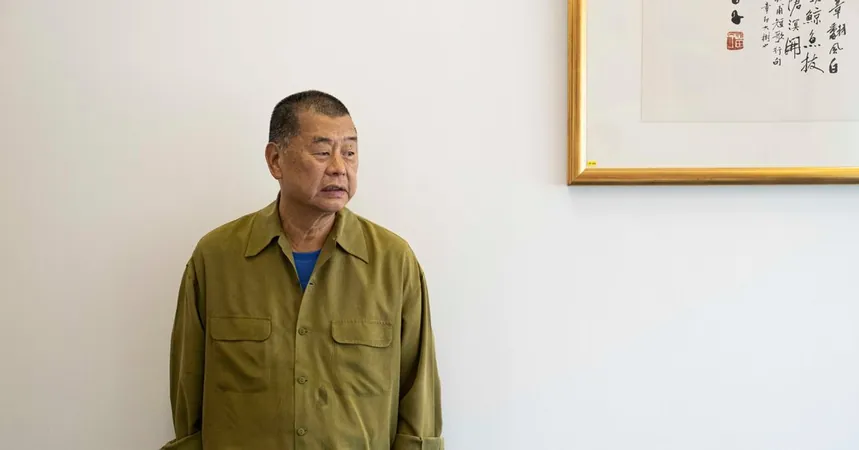
77-Year-Old Hong Kong Media Tycoon Jimmy Lai Defends Himself Amid National Security Trial
2024-11-21
Author: Ken Lee
Introduction
In a striking transformation from his fiery past, Jimmy Lai, the founder of the now-defunct pro-democracy newspaper Apple Daily, took the stand for the first time in his high-stakes national security trial in Hong Kong. Recognized as a vocal critic of China’s Communist Party and a staunch supporter of democracy, Lai, 77, now faces serious charges that could result in a life sentence if convicted.
Background of the Trial
Lai's trial is taking place against the backdrop of escalating tensions in Hong Kong following Beijing’s imposition of a national security law in 2020. This law has been employed to suppress the freedoms that once set Hong Kong apart from the mainland, leading to widespread international condemnation. Lai’s arrest and subsequent charges have drawn attention globally, symbolizing a shift in the region's political landscape.
Lai's Testimony
During his testimony on Wednesday, Lai attempted to soften his image, distancing himself from critical editorial decisions made at Apple Daily and denying any close ties with Western politicians, whom prosecutors accuse him of conspiring with. He categorically dismissed Taiwan’s independence movement and claims of Hong Kong’s secession as 'crazy,' suggesting a newfound desire to temper his confrontational rhetoric in the face of potentially grave consequences.
Lai's Political Impact
Lai has been in jail for nearly four years, a period that has turned him into a central figure in the fight for democracy in Hong Kong. He has pleaded not guilty to accusations of conspiring and colluding with 'foreign forces' to undermine China's authority. His testimony, expected to span several weeks, lies at the heart of a high-profile legal battle scrutinized by international observers.
Courtroom Dynamics
The courtroom was packed as Lai conveyed that meetings with various American politicians were misunderstood, characterizing interactions with notable figures like former national security adviser John Bolton and then-Speaker of the House Nancy Pelosi as inconsequential. He mentioned the small donations made to American think tanks, arguing they were 'too small to even be mentioned.' His assertion flouted the prosecution's depiction of him as a radical figure orchestrating global campaigns against China.
Impact on Democracy
In recent days, as the trial unfolded, a wave of prosecutions against former pro-democracy lawmakers and activists has resulted in prison sentences of up to ten years, raising alarms about the shrinking space for dissent in Hong Kong. Jail time for Lai, as well as the implications for other activists, suggests a broader crackdown on opposition figures.
Lai's Transformation
Before becoming embroiled in political activism around the time of the Tiananmen Square protests in 1989, Lai was known as a successful businessman, having built a clothing empire. His pivot to journalism in the 1990s positioned Apple Daily as a critical voice during the 2019 protests, heavily enhancing its readership through its daring coverage and editorial stance.
Defense Against Accusations
While Lai sought to defend his newspaper and its mission, he faced a pointed challenge from a former deputy who testified against him, claiming that after his arrest, he encouraged the publication to continue operating as it had before. Lai countered, insisting that he advised caution during a time fraught with risk.
Health Concerns
Concerns for Lai's health loom large, given his age and ongoing health challenges, including diabetes and solitary confinement, where he spends up to 23 hours a day. As supporters rally for his release, including his son, Sebastien, who has taken his father’s plight to an international audience, the trial encapsulates the precarious situation for democracy advocates in Hong Kong.
International Reactions
Adding fuel to the fire, Western governments, including the United States and the United Kingdom, have staunchly criticized Lai’s treatment, urging authorities in Hong Kong to reconsider their approach to dissidents. As the world watches closely, Lai’s case may prove pivotal in the continuing narrative of Hong Kong’s battle for democracy and freedom of expression against authoritarian encroachment.


 Brasil (PT)
Brasil (PT)
 Canada (EN)
Canada (EN)
 Chile (ES)
Chile (ES)
 España (ES)
España (ES)
 France (FR)
France (FR)
 Hong Kong (EN)
Hong Kong (EN)
 Italia (IT)
Italia (IT)
 日本 (JA)
日本 (JA)
 Magyarország (HU)
Magyarország (HU)
 Norge (NO)
Norge (NO)
 Polska (PL)
Polska (PL)
 Schweiz (DE)
Schweiz (DE)
 Singapore (EN)
Singapore (EN)
 Sverige (SV)
Sverige (SV)
 Suomi (FI)
Suomi (FI)
 Türkiye (TR)
Türkiye (TR)